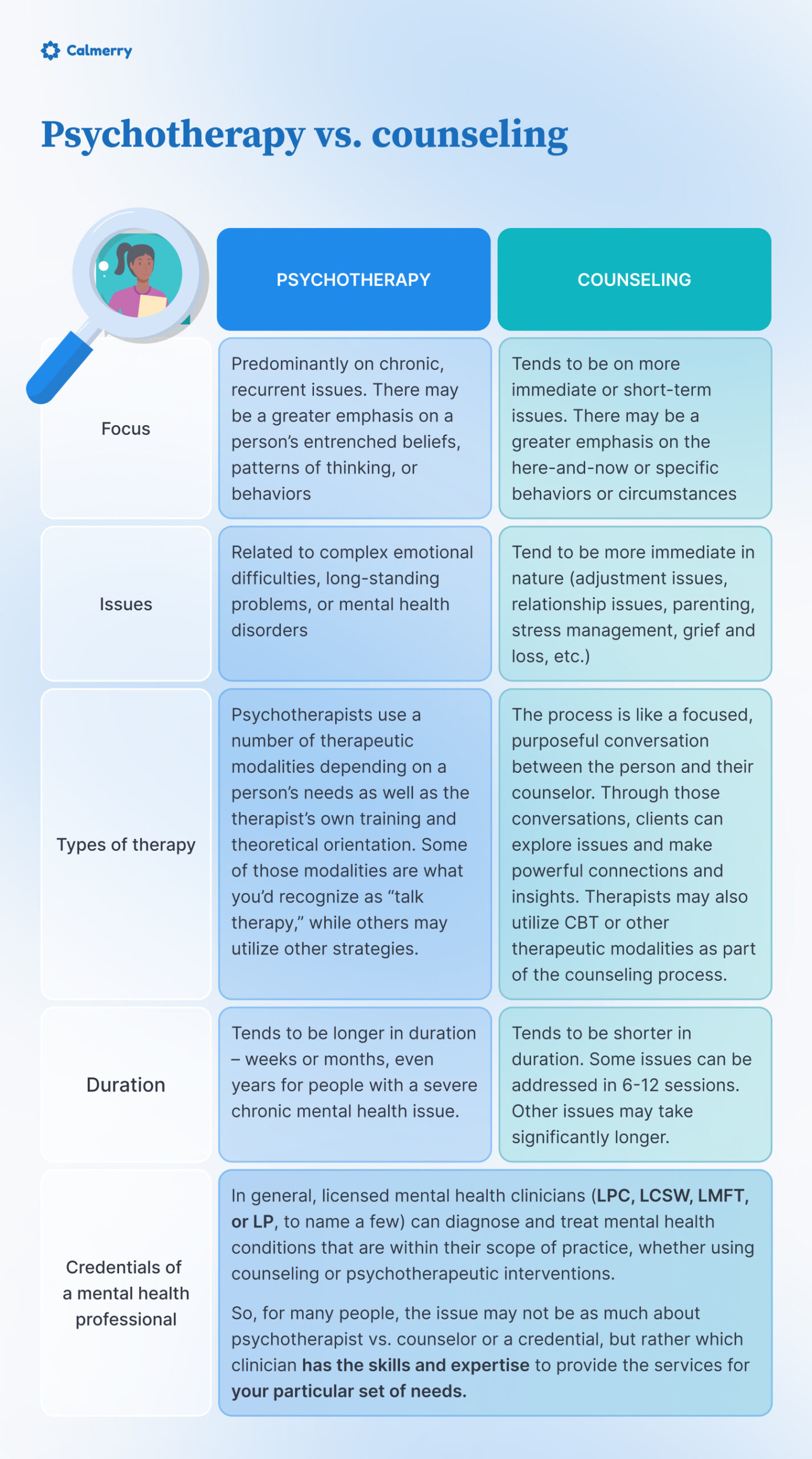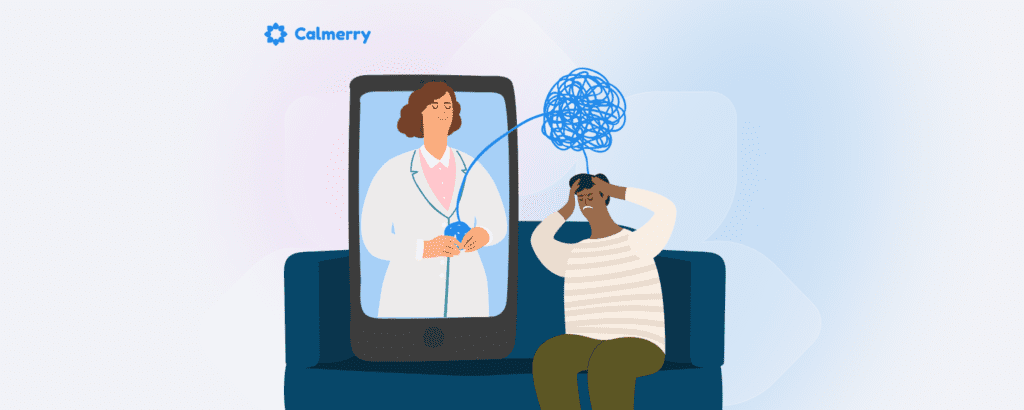Psychotherapy vs. Counseling: Does the Difference Really Matter?

In this article
If you’ve been on a search to find just the right therapist or type of therapy, you’ve probably come across a gazillion terms to describe types of therapy – therapy, counseling, psychotherapy, and others. It can be confusing and leave you wondering which option is right for you.
Therapy is not a single kind of treatment, nor is it a term that is exclusive to the mental health world, although it is most often used to reference mental health care. Therapy is a term that broadly refers to a treatment that is used to treat a condition.
Therapy can refer to a treatment for some physical condition (e.g., physical therapy, massage therapy, chemotherapy) or something psychological. The prefix “psycho” is derived from the Greek psykhe meaning “soul”, “spirit”, or “mind as the seat of thought”. [1] psycho- | Etymology of prefix psycho- by etymonline. (n.d.). Etymonline. https://www.etymonline.com/word/psycho-
Counseling and psychotherapy are two approaches to providing therapy for mental health issues.
Which type of therapy is right for you? In this article, we’ll take a closer look and give you some tips for choosing the right option for you.
Similarities of psychotherapy and counseling
On the surface, psychotherapy and counseling might sound like the same thing, and quite often, these terms are used interchangeably.
In fact, they do share some similarities:
- Both counseling and psychotherapy involve evaluating, diagnosing, and treating mental and behavioral disorders.
- Both psychotherapy and counseling can help improve a person’s mental health and well-being
- Both psychotherapy and counseling are generally considered forms of “talk therapy”
- There are circumstances when either approach can help someone
- A person may engage in both counseling and psychotherapy depending on their unique needs
- Both psychotherapy and counseling have proven to be effective and an important part of addressing mental health issues
Despite their similarities, there is a distinct difference between psychotherapy and counseling. Which approach is best for someone depends on their unique mental health needs and preferences.
What is psychotherapy?
Psychotherapy is an approach to mental health therapy that helps a person explore and change troubling thoughts, feelings, and behaviors and manage symptoms related to a mental health condition.
It tends to be longer in duration than some other forms of therapy and is provided by a licensed mental health clinician.
Rather than a single “treatment”, psychotherapy is a broad approach that includes several different types of therapy. Which type of therapy a therapist might choose will depend on your unique preferences and needs as well as the therapist’s theoretical orientation and training.
For example, treatment for someone with post-traumatic stress disorder (PTSD) would be different than treatment for someone with OCD (obsessive-compulsive disorder) or a mood disorder.
The benefits of psychotherapy include:
- Symptom reduction – psychotherapy is considered the first-line treatment for most mental health disorders.
- Recovery from trauma
- Improved relationships
- Increased resiliency
- Improved emotional regulation
- Improved self-esteem
- Increased self-awareness
- Increased sense of well-being and quality of life
What is counseling?
Counseling is an approach to mental health treatment based on a wellness model that aims at improving quality of life via collaboration between counselor and client. It is a blend of guidance and therapy.
Counseling tends to be short-term and solution-focused, helping people deal with current problems and issues.
Counselors work with clients to improve their mental and emotional health and learn effective problem-solving and coping skills. Counseling can help people with problematic issues such as family conflict, parenting, relationship problems, stress, or navigating major life transitions (e.g., aging, having children, empty nest).
Mental health counselors are licensed masters-level clinicians and are also trained in providing psychotherapy to help people manage mental health conditions.
Benefits of counseling include:
- Reduction of symptoms and improved mood [2] Gingerich, W. J., & Eisengart, S. (2000). Solution‐Focused Brief therapy: A review of the outcome research*. Family Process, 39(4), 477–498. https://doi.org/10.1111/j.1545-5300.2000.39408.x
- Improved self-esteem
- Increased insight and awareness
- Increased resilience and optimism [3] Johnston, M. C., Porteous, T., Crilly, M. A., Burton, C., Elliott, A. M., Iversen, L., McArdle, K., Murray, A., Phillips, L. H., & Black, C. (2015). Physical Disease and Resilient Outcomes: A Systematic review of resilience Definitions and study methods. Psychosomatics, 56(2), 168–180. https://doi.org/10.1016/j.psym.2014.10.005
- Improved coping skills
- Psychoeducation (learning about mental health conditions, diagnoses, and treatment options)
Here’s where it gets confusing.
It is important to note that historically, the term “counselor” has been used to describe any number of helping roles, from a highly trained mental health clinician to school guidance counselors to peer support staff and volunteers, pastoral counselors, even summer camp counselors.
In some places, non-licensed counselors can provide some types of mental health counseling, but there are usually some restrictions.
So, there’s a lot of confusion about just what counseling is, and when choosing your therapist, you have to do your homework and know what type of services they provide.
For the purpose of this article, we will remain focused on mental health counseling, which is most often provided by a licensed clinician.

Key differences between psychotherapy and counseling
While there is a lot of overlap, and it sounds like arguing semantics, there are differences in counseling vs. psychotherapy that can help you determine which approach might be most suitable to your needs:
1. Focus
The focus of therapy depends on what needs the client has and their preferences for working on them.
Psychotherapy – Focus is predominantly on chronic, recurrent issues. There may be a greater emphasis on a person’s entrenched beliefs, patterns of thinking, or behaviors.
Counseling – Focus tends to be on more immediate or short-term issues. There may be a greater emphasis on the here-and-now or on specific behaviors or circumstances.
2. Issues
People come to therapy for many different kinds of issues. Some issues are more amenable to a counseling approach. Other issues require more intense psychotherapy.
As with other areas, there is some overlap, and what a person may need during their treatment depends on what brings them into care.
Psychotherapy – Problems addressed in psychotherapy are usually related to emotional difficulties or a mental health disorder such as:
- Anxiety
- Depression
- Schizophrenia
- Personality disorders
- Eating disorders
- Post-traumatic stress disorder
Psychotherapy can help the person to deal with these complex issues and improve functioning in their daily lives.
Counseling – Problems addressed in counseling tend to be more immediate in nature. Some of the most common issues that can be addressed with counseling can include:
- Adjustment issues
- Self-esteem
- Family or relationship issues
- Parenting
- Work-life balance
- Stress management
- Life transitions
- Grief and loss, and more.
3. Types of therapy
Just what type of therapy you might need depends on your own unique situation. As with other elements of therapy, there is some overlap when it comes to counseling and psychotherapy.
Psychotherapy – Psychotherapists utilize a number of therapeutic modalities depending on a person’s needs as well as the therapist’s own training and theoretical orientation. Some of those modalities are what you’d recognize as “talk therapy,” while others may utilize other strategies.
Some of the more well-known types of psychotherapy include:
- Cognitive Behavioral Therapy (CBT)
- Dialectical Behavior Therapy (DBT)
- Psychodynamic Therapy
- Psychoanalysis
- Eye movement desensitization and reprocessing (EMDR)
- Other modalities, such as art therapy, music therapy, or animal-assisted therapy, may be included as well.
Counseling – Counseling is probably what you think of when you hear “talk therapy”. The process of counseling is like a focused, purposeful conversation between the person and their counselor.
Through those conversations, clients are able to explore issues and make powerful connections and insights. As they do, clients are able to tap into their own strengths and develop coping skills, empowering them to find solutions that work for them. It is very much a positive, client-centered process.
Therapists may also utilize CBT or other therapeutic modalities, such as solution-focused brief therapy (SFBT), as part of the counseling process to help their clients navigate their issues.
4. Duration
It’s a question most people have when they start therapy: “How long will it take?” It’s a legitimate question, but the answer is that it depends. Part depends on the type of treatment you need.
Psychotherapy – Because psychotherapy tends to focus on deeper, long-standing patterns, the process tends to be longer in duration – weeks or months, even years for people with a severe chronic mental health issue.
Counseling – Counseling tends to focus more on present issues and specific behaviors or situations, and as such, tends to be shorter in duration. Some issues can be addressed in 6-12 sessions. Other issues may take significantly longer.
5. Navigating the alphabet
Are they a psychotherapist or a counselor?
In your search for a therapist, you’ve probably come across credentials of every kind – LPC, LCSW, LMFT, or LP, just to name a few. These various credentials reflect the multiple disciplines and types of mental health professionals that can provide both psychotherapy and counseling services.
It can be confusing when trying to decide who to see.
In general, licensed mental health clinicians are able to diagnose and treat mental health conditions that are within their scope of practice, whether using counseling or psychotherapeutic interventions.
Even within each group, it’s important to note that what each type of clinician can provide is also dependent on their particular state’s licensing board and statutes.
- LPC – A Licensed Professional Counselor is a licensed clinician with at least a master’s degree in counseling or a related field. Some may also have a doctoral degree and additional areas of expertise or specialty.
- LMFT – A Licensed Marriage and Family Therapist is a licensed clinician with at least a master’s degree, usually in marriage and family therapy, and specialized training in marital and family therapy. Some may also have a doctoral degree and additional areas of expertise or specialty.
- LCSW – A Licensed Clinical Social Worker is a licensed clinician with a master’s degree in social work. They are trained to diagnose and treat mental health conditions, provide therapy, and provide case management and advocacy services. They may be in private practice and are also often found in a medical/hospital setting.
- LP – A Licensed Psychologist is a licensed clinician with a doctoral degree in psychology (PhD, PsyD) from an accredited program in psychology. They are trained to diagnose and treat mental health conditions and provide therapy. They may also provide psychological testing services. Some LPs are also licensed to prescribe medication in some states (sometimes referred to as Medical Psychologists).
So, for many people, the issue may not be as much about psychotherapist vs. counselor or a credential, but rather which clinician has the skills and expertise to provide the services for your particular set of needs.
– Dr. Dawn Ferrara, PsyD, Licensed Professional Counselor (LPC), and mental health writer
Choosing your therapist
Choosing the person you want to work with is a very personal decision. Finding your therapist is more than just checking one off of a list.
- You want someone with the credentials and expertise you need.
- You want someone who is accessible and available where and when it fits your schedule.
- You also want a therapist that you feel connected with. And this may be the most important factor of all.
What often gets overlooked in choosing a therapist is the fit – that connection you feel with someone when you know that they “get you” and that you feel safe to be open and honest with them. It’s a highly personal preference and something you want to pay attention to.
Why does fit matter so much?
What many people don’t know is that the relationship between a therapist and client, often referred to as the therapeutic alliance, is just as important as a therapist’s skills and expertise.
In fact, studies have found that the therapeutic alliance is a fundamental aspect of psychotherapy and is strongly linked to treatment success regardless of the specific treatment modality used. In other words, the fit matters. [4] Stubbe, D. (2018). The therapeutic alliance: the fundamental element of psychotherapy. Focus, 16(4), 402–403. https://doi.org/10.1176/appi.focus.20180022
– Dr. Dawn Ferrara, PsyD, Licensed Professional Counselor (LPC), and mental health writer
So, how can you find someone that fits your needs and preferences? Here are some tips for finding your therapist:
1. Before you go
Before you go, think about your goals for therapy:
- What do you want help with?
- What are your preferences for session times?
- What’s your budget?
- What qualities, besides training and expertise, do you want in a therapist? For example, do you prefer someone who is very directive, or do you prefer someone who is more collaborative or more client-centered?
- Do you have therapist preferences for culture, or gender, or age?
Your preferences and needs play a key part in that connection you’ll make with your therapist.
2. Choosing your therapy
Which type of clinician and therapy you need may depend on what you’re seeking help for.
Psychotherapy may be more helpful if:
- You have a diagnosed mental illness such as a personality disorder, a mood disorder like depression, or PTSD, or you suspect you may have a mental health disorder.
- You’re struggling with chronic mental or emotional issues
- Counseling wasn’t helpful or seemed to not be quite enough
- You have a history of trauma or a difficult past
- Your emotional struggles are impacting your relationships and daily functioning
- Self-help has not been helpful
Counseling might be more helpful if:
- Your issues are related to a current, specific issue (e.g., a recent loss, life transition)
- You’re dealing with substance dependence (or dealing with a loved one who is in dependency)
- You’re seeking guidance and support to find solutions for the problem that brings you to therapy
- You want to learn coping skills for dealing with the issues that are troubling you (e.g., stress management, improving communication skills, anxiety reduction)
- Self-help hasn’t been successful
Again, it’s important to note that you may benefit most from one or the other, or you might need both psychotherapy and counseling as you progress through treatment. One is not better than the other. They are both effective approaches. So much depends on your own unique needs. A skilled therapist will help you determine what’s right for you.
3. Qualifications
You want your therapist to have the training and expertise needed to help you address your needs. While training varies widely, a few things to look for and ask about include:
- A license to practice as a mental health professional in your state
- Training in the area of need you have
- Experience in treating the needs you have
- What is their approach to counseling or psychotherapy? What modalities do they use?
4. Availability
Finding someone who has the expertise you need is great, but they also have to be accessible to you.
- What are their office hours?
- Are appointments available?
- Do they offer telehealth services?
Availability can be the hardest obstacle to overcome. With work schedules, school drop-offs, traffic, and more, just arranging time to get to the therapy office can be enough to stop you in your tracks. The good news is online therapy removes the problems of accessibility.
Once you have your preferences and needs identified, the next step is to choose your therapist. You can ask for recommendations from friends and family or access online resources.
Why try online therapy
Online therapy has emerged as a popular alternative to traditional in-office therapy and makes it easy to see a therapist when and where it works best for you.
Sessions can be scheduled at your convenience and from the comfort of your home or other private location. And, most importantly, online therapy has proven to be as effective as in-office therapy for many issues.
If online therapy sounds like the fit for you, Calmerry can help.
Start your counseling or psychotherapy with Calmerry
At Calmerry, we believe that mental health care should be readily accessible when someone is in need.
We have experienced counselors and psychotherapists who understand the challenges you’re facing and can help you find balance and healing with the therapeutic approach that is right for you.
When you complete a brief survey, you can be matched with a mental health professional within one hour and start therapy in one to two business days.
There’s no waiting weeks or months for an appointment. And there’s no complicated process to get started. One tap – and you’re on your way to getting the help you’re seeking.
When you’re ready, we’re here.
psycho- | Etymology of prefix psycho- by etymonline. (n.d.). Etymonline. https://www.etymonline.com/word/psycho-
Gingerich, W. J., & Eisengart, S. (2000). Solution‐Focused Brief therapy: A review of the outcome research*. Family Process, 39(4), 477–498. https://doi.org/10.1111/j.1545-5300.2000.39408.x
Johnston, M. C., Porteous, T., Crilly, M. A., Burton, C., Elliott, A. M., Iversen, L., McArdle, K., Murray, A., Phillips, L. H., & Black, C. (2015). Physical Disease and Resilient Outcomes: A Systematic review of resilience Definitions and study methods. Psychosomatics, 56(2), 168–180. https://doi.org/10.1016/j.psym.2014.10.005
Stubbe, D. (2018). The therapeutic alliance: the fundamental element of psychotherapy. Focus, 16(4), 402–403. https://doi.org/10.1176/appi.focus.20180022
online therapy
live video session



